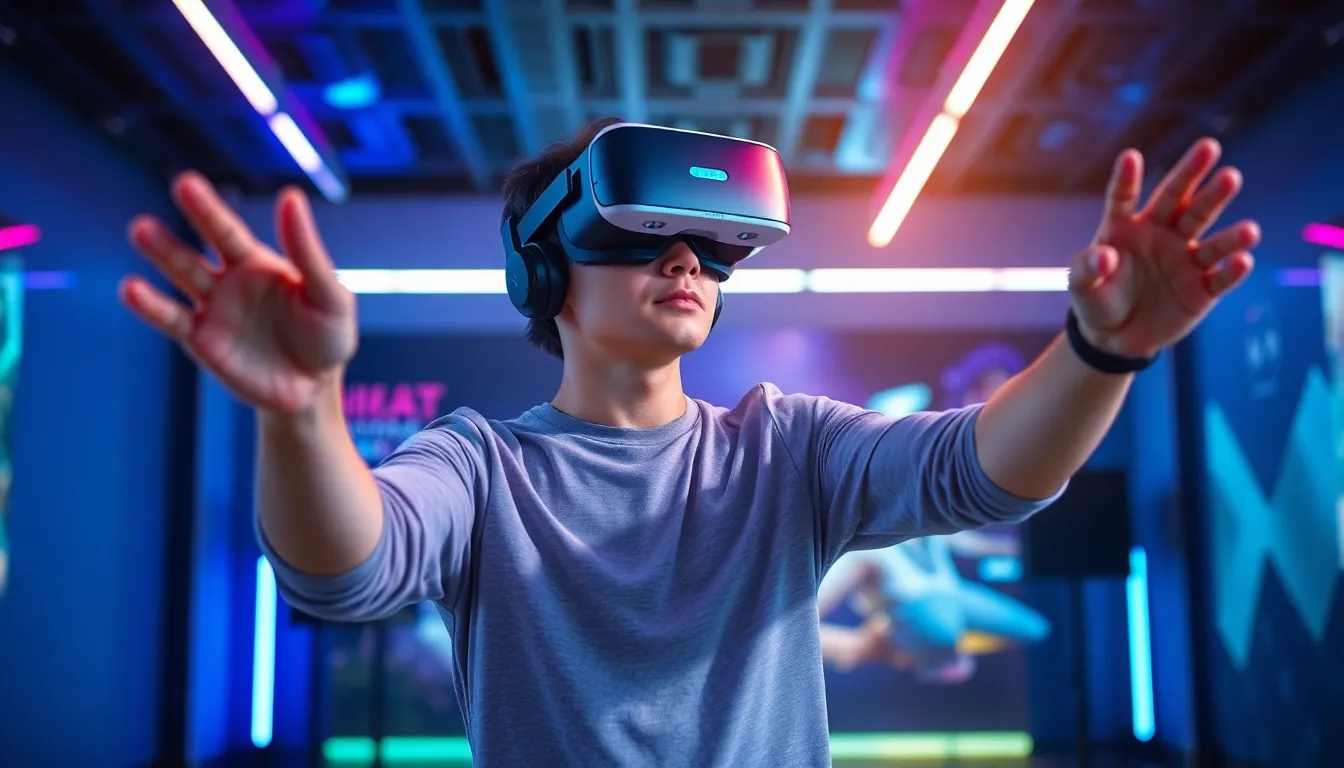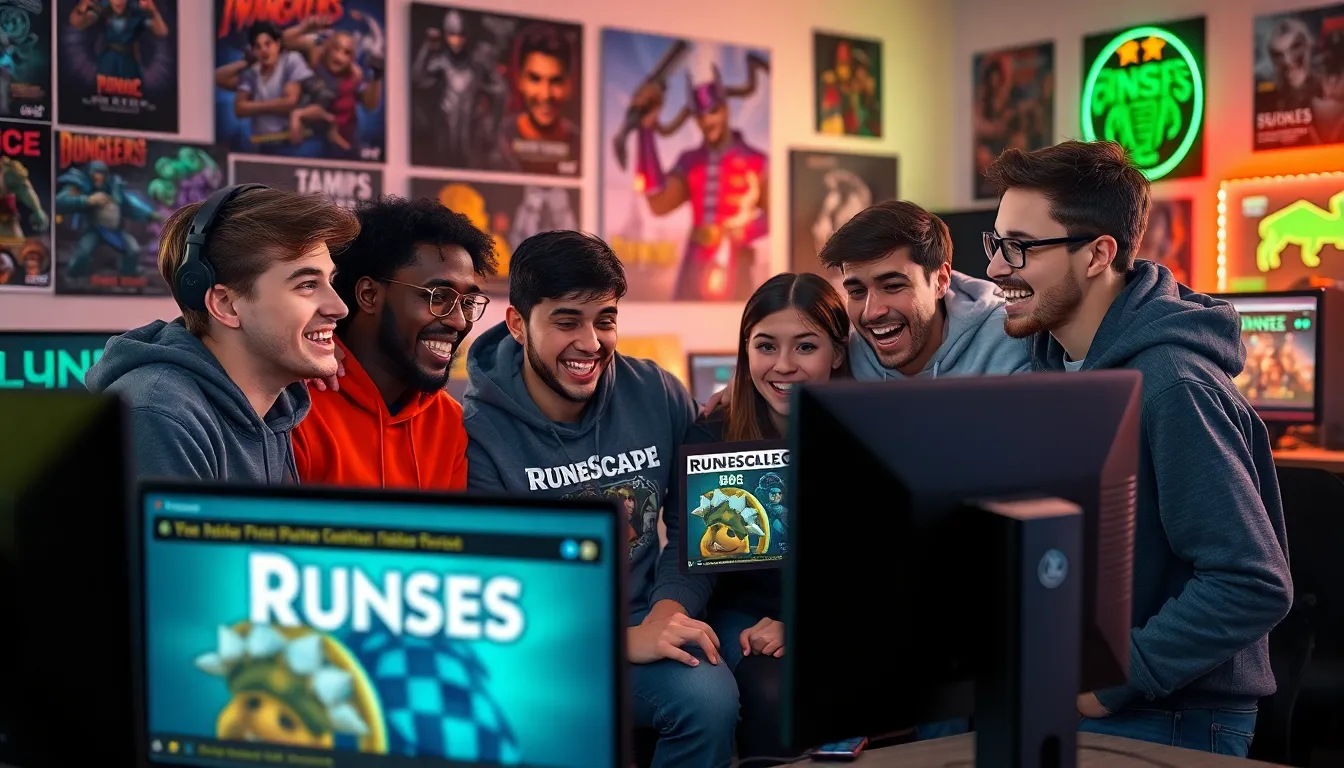Imagine hosting an event where attendees can mingle with a dragon, dance on the moon, or even attend a concert from the comfort of their living rooms. Welcome to the world of VR event hosting! This innovative approach is revolutionizing how people connect, collaborate, and celebrate, making traditional gatherings feel like yesterday’s news.
Table of Contents
ToggleOverview of VR Event Hosting
VR event hosting revolutionizes traditional gatherings by providing interactive and immersive environments. It allows participants to engage in activities that may not be possible in reality. Virtual spaces accommodate various event types, including conferences, trade shows, and social gatherings.
Users experiencing VR events connect with others globally, fostering a sense of community while enjoying vivid scenarios. Attendees can interact with gamified elements or partake in live performances without geographical barriers. Creating memorable experiences enhances attendee engagement through this technology.
Platforms like AltspaceVR and VRChat empower event organizers to design custom environments. Organizers customize stages, booths, and lounges, accommodating diverse attendees. Engaging content becomes central to event success when using VR, captivating participants and enhancing brand visibility.
Analytics tools integrated into these platforms allow for data-driven decisions. Organizers track audience engagement, monitor key metrics, and refine strategies based on feedback. Tailored content emerges as a priority, ensuring events resonate with participants’ interests.
Security and accessibility remain crucial considerations. Robust security measures protect user data while accommodations ensure inclusivity for all participants. As technology evolves, VR event hosting continues to expand possibilities, enhancing connections and redefining how people gather and celebrate.
Benefits of VR Event Hosting

VR event hosting offers significant advantages over traditional gatherings. Engaging participants in immersive environments enhances overall experiences.
Enhanced Engagement
Enhanced engagement is one of the most notable benefits of VR event hosting. Virtual reality captures attention more effectively than standard formats. Participants can interact with dynamic elements, boosting interest. Live performances create a more exciting atmosphere. Networking opportunities abound as attendees connect in unique ways. Users can explore virtual spaces at their own pace, which fosters deeper connections. Gamification elements keep the experience entertaining and interactive, making gatherings memorable. Consequently, organizations benefit from increased participation and retention rates.
Cost-Effectiveness
Cost-effectiveness represents a crucial advantage of VR event hosting. Hosting events virtually often incurs lower expenses than physical venues. Reduced travel costs eliminate barriers for attendees from various locations. Organizers save on logistics, such as catering and accommodation. Additionally, costs related to printed materials diminish, as digital alternatives become available. Significant reach without geographical constraints allows for larger audiences at a fraction of the price. Flexible budgeting increases accessibility for brands of all sizes. Ultimately, VR hosting maximizes return on investment while delivering exceptional value.
Key Features of Successful VR Events
Successful VR events stand out due to their unique features that enhance participant experiences. Organizers can implement these key aspects to attract and engage attendees effectively.
Customization Options
Customization options play a significant role. Attendees can enjoy personalized environments tailored to the event theme. Organizers use platforms like AltspaceVR or VRChat to design spaces that incorporate branding, interactive elements, and thematic visuals. Custom avatars allow participants to express themselves, adding a personal touch to the experience. Event hosts can also develop tailored agendas, ensuring the content aligns with audience interests and preferences.
Networking Capabilities
Networking capabilities are crucial for fostering connections among attendees. The immersive nature of VR allows participants to engage in meaningful conversations without geographical limitations. Virtual lounges and breakout rooms enable informal networking opportunities, enhancing relationship building. Gamified interactions encourage collaboration, making networking more enjoyable. Event organizers can facilitate structured sessions, such as speed networking or panel discussions, maximizing participant engagement and connection potential.
Leading Platforms for VR Event Hosting
Several platforms excel in VR event hosting, offering unique features and capabilities tailored to diverse needs. AltspaceVR stands out with customizable environments that promote social interaction. This platform supports activities ranging from conferences to social gatherings, fostering engagement and collaboration among participants.
VRChat presents another compelling option for event organizers. It allows users to create immersive worlds and host events that encourage creativity and interaction. This platform’s built-in social tools enhance the networking experience, enabling attendees to meet and connect seamlessly.
Gather focuses on creating versatile spaces tailored to various events. It combines 2D and 3D elements, making it intuitive for users to navigate different environments. Featuring customizable avatars and rooms, Gather enhances the sense of presence, making it ideal for both casual and professional gatherings.
Engage delivers robust features catered to corporate events. This platform includes tools for live streaming, video conferencing, and interactive presentations. Enhanced analytics allow event organizers to assess engagement and make data-driven decisions for future events.
Mozilla Hubs emphasizes accessibility, enabling anyone to create and join events using just a web browser. It facilitates simple sharing of virtual spaces, making it easy for users to participate without needing advanced VR equipment. The platform prioritizes inclusivity with consistent updates and community-driven improvements.
Alongside these platforms, Facebook Horizons aims to capture a broad audience. It integrates social media elements, allowing users to invite friends and share experiences. This creates a social ecosystem where virtual interactions mimic real-life connectivity.
These platforms contribute significantly to the growth of VR event hosting, making immersive experiences more accessible and engaging, while close attention to user feedback ensures they meet the evolving needs of attendees.
Best Practices for Planning a VR Event
Planning a VR event requires careful attention to several key aspects. First, define the event’s goals and target audience. Knowing the objectives guides the content creation and platform selection. Next, choose a suitable platform that matches the event’s needs, such as AltspaceVR or Gather. Each offers distinct features that appeal to various audiences.
Event creators must prioritize customization. Tailoring environments to reflect the theme enhances participant engagement. Incorporating gamified elements also adds an interactive layer, making the experience memorable. Engaging content serves as a cornerstone for VR events. It captivates attendees and keeps them coming back for more.
Promote the event effectively across multiple channels. Utilize social media, email newsletters, and industry partnerships to maximize reach. Engaging promotional materials help draw interest and encourage sign-ups. Setting a clear timeline also aids in organizing tasks and ensuring all aspects are covered.
Integrating analytics tools into VR platforms can offer insights into audience engagement. These insights allow organizers to adapt strategies in real-time and refine future events. Collaborating with sponsors or presenters contributes to enriching the content and provides additional resources.
Ensuring accessibility is equally important. Establishing measures to accommodate diverse audiences fosters inclusivity. Attendees appreciate environments that are easy to navigate and access.
Finally, practice moderating and guiding the event. Effective facilitation can keep discussions on track and ensure all voices are heard. Thorough planning, thoughtful execution, and active engagement are essential for successful VR event hosting.
VR event hosting is redefining how people connect and celebrate. By creating immersive environments that foster engagement and interaction, it offers unique experiences that traditional events simply can’t match.
With platforms like AltspaceVR and VRChat leading the charge, organizers can craft customized events tailored to their audience’s interests. The ability to integrate gamified elements and networking opportunities enhances connections and boosts retention rates.
As technology advances, the potential for VR events will only grow. Embracing this innovative approach not only maximizes reach but also creates memorable experiences that resonate with participants long after the event ends.








